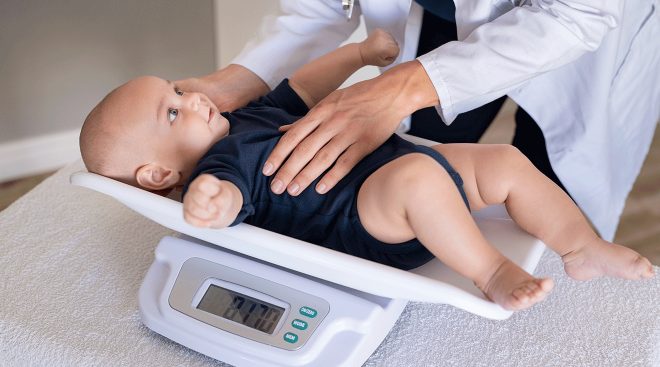Questions to Ask When Interviewing a Pediatrician
You spent a good deal of time finding the right prenatal provider to guide you through pregnancy. As you get closer to your due date, it’s time to put the same amount of careful thought and attention into choosing a pediatrician for baby. Wondering how to get set up with a pediatrician before baby is even born? And how should you go about finding one that’s right for your family’s needs? Below, all the questions to ask a pediatrician you’re considering, plus what to think about as you’re selecting one.
Wondering how to pick a pediatrician? Starting the search for your future child’s doctor may seem daunting, but there are several resources you can use to help. One of the best ways to begin your search is by simply asking friends, family members and your prenatal care providers, advises Denise Scott, MD, an Oklahoma-based pediatrician and author of Feed Your Child’s Future Health: Prevent Disease Before It Starts.
“Social media groups can [also] be a great way to hear from a wide range of people about their experiences with local providers,” adds Rebekah Mustaleski, CPM-TN, a certified professional midwife and compression director with Motif Medical.”
Of course, you can also Google pediatricians in your area and look at reviews and ratings. Contacting local hospital nurseries and asking which pediatricians they work with can also help lead the way. You might also want to check with your insurance to find out which providers are in-network for your plan.
Finally, you can also consult the American Academy of Pediatrics (AAP) members directory in your area. To truly do your due diligence, run each candidate’s name through your state’s medical board to check for any previous disciplinary action.
Qualities to look for in a provider
Your pediatrician should be board certified, which Scott notes is usually required for insurance and hospital privileges, as well as have a few years of experience under their belt. But along with reviewing ratings and certifications, look at the pediatrician’s characteristics and personality traits. “A pediatrician should be warm and welcoming,” Scott says, adding that it’s often nice if they’re a pediatrician and a parent. “[They] have the experience of caring for a sick child as a working parent.”
Mustaleski agrees, but adds that qualities you look for will likely depend on “what’s more important to you as a parent,” as you’ll want someone who aligns with your beliefs on feeding, childcare and medicine. “Regardless of what your priorities are, the most important thing is that you can develop a relationship of trust and easy communication with your child’s provider,” she says. “This will help smooth the way for whatever parenting challenges lie ahead—and we all run into those.”
Both experts say it’s never too early to begin the search for baby’s provider and gather all your research. Scott notes that most expectant parents start looking during the last trimester. It might be helpful to settle on baby’s provider by your seventh or eighth month so you can focus on labor and delivery as your due date approaches. At the very least, you’ll want to have your pediatrician picked before delivery, as this will ease some of your stress in the last few weeks of pregnancy. Plus, not only will the hospital need your pediatrician’s name before you’re discharged, but you’ll also need to call them to schedule baby’s first appointment pretty soon after birth.
While it’s not necessary to interview your pediatrician, it can be incredibly helpful. The main goal of interviewing a pediatrician is to learn more about their provider style, office and personality, explains Scott. For example, “Is [their office] clean, kid-friendly and welcoming?” she notes. Plus, there’s usually no cost associated with these visits, so it’s a good opportunity to get a sense of whether they’re a good fit. “It’s also not a bad idea to interview several [providers],” Scott adds.
However, while interviews can be helpful, Mustaleski points out that “not all pediatricians are able to accommodate all of the requests for interviews they receive.” If you can’t interview your preferred pediatrician for any reason, she suggests bringing your questions for them to baby’s first appointment to ensure your values are aligned.
Once you’ve got a few names, it’s time to set up the interviews. And since you’ll probably only have about 10 minutes to size up the candidate, it’s critical to have the right questions all cued up. As you think of your list of questions, think about what’s most important to you. Below, the experts and the AAP provide some sample questions to ask when interviewing a pediatrician. And, remember, there are no “right” answers here, as every family’s needs, priorities and preferences are bound to differ. Instead, let your (baby-filled) gut be your guide.
Questions about their experience
- How long have you been in practice?
- Where did you attend medical school?
- Are you a member of the American Academy of Pediatrics?
- Do you have any kids of your own?
- Do you have any sub-specialties?
- Do you see babies in the hospital? If so, what hospitals do you work in? If my child has to be hospitalized, where would they be admitted?
Questions about their childcare philosophies
- What are your views on vaccines, antibiotics and alternative medicine? Is there flexibility in this?
- What are your views on breastfeeding, bottle feeding and formula? What about circumcision, sleep training, etc.? Is there flexibility in this?
- Do you perform circumcisions?
- Does your office have breastfeeding support?
- Do you advocate for any alternative therapies?
- Will you discuss issues such as parenting styles and strategies, as well as my child’s emotional and social development?
Questions about their office policies and logistics
- What is your schedule for well baby checkups?
- How far in advance do baby’s appointments need to be scheduled?
- Do you offer same-day sick appointments?
- What are your office hours? Are you available to see us in the evenings or on weekends? What are the after-hour policies?
- What if my baby gets sick when the office is closed? How are off-hour emergencies handled?
- Is this a solo or group practice? If it’s solo, who covers for you when you’re gone? If it’s a group, how often will we see the other providers in the practice?
- Do you offer telemedicine visits?
- Do you respond to questions by email? Do you accept calls for routine and non-emergency questions? If I leave a message, how long does it usually take you to return the call?
- Will your initial meeting with my baby be at the hospital or during the first checkup?
- Do you have separate sick and well waiting rooms?
- What tests are handled in the office, and what is done elsewhere? Where?
- Do you accept my insurance?
- What are your policies for insurance claims, labs, payments and billing?
- Is there a charge to fill out forms or an annual fee to pay?
Along with questions for baby’s pediatrician, you’ll also want to ask yourself some questions, including:
- Did I feel comfortable in the presence of this provider? Did I like their communication style and bedside manner?
- Was the interview rushed? Did they take the time to clearly address all of your questions?
- Did the provider seem compassionate and patient? If baby was present, how did they respond to them?
- Was the office clean?
- Was the waiting room kid-friendly, with toys and books?
- How long was the wait?
- How easy was it to schedule the interview?
- Was the office staff helpful? Were the nurses friendly?
- Was the office conveniently located and easy to get to? Did it offer adequate parking?
“Choosing a doctor to care for your child is an important step, as this person will be with your family for years to come—pediatricians take care of kids from birth to [age] 21,” Scott says. “You want to find someone you trust… Meeting with a pediatrician in advance at least gives you an impression to see if they’re a good fit for your family, and it’s a less hurried decision when you need to have one chosen prior to leaving the hospital with your newborn.”
That said, don’t feel locked in if you feel like your chosen pediatrician isn’t a good fit for your family as baby starts to see them. Scott notes parents should feel encouraged to interview any new pediatricians they’re considering switching to. “It’s a chance to bring your child or children with you to see how the provider interacts with them,” she says.
Please note: The Bump and the materials and information it contains are not intended to, and do not constitute, medical or other health advice or diagnosis and should not be used as such. You should always consult with a qualified physician or health professional about your specific circumstances.
Denise Scott, MD, is a pediatrician and a pediatric endocrinologist based in Oklahoma with over 30 years of experience. Certified in culinary medicine, Scott also runs the blog Feed Future Health and is the author of Feed Your Child's Future Health: Prevent Disease Before it Starts. She received her medical degree from the University of Texas Medical Branch and completed her residency at the University of Oklahoma Health Sciences Center with a fellowship at the National Institutes of Health.
Rebekah Mustaleski, CPM-TN, IBCLC, is a certified professional midwife specializing in evidence-based maternity care. She co-founded Roots & Wings Midwifery in Knoxville, Tennessee. Mustaleski received her bachelor’s degree in psychology from Centre College and worked as a doula and birth photographer prior to establishing Roots & Wings.
Healthy Children (American Academy of Pediatrics), Find a Pediatrician or Pediatric Specialist
Healthy Children (American Academy of Pediatrics), How to Choose a Pediatrician, January 2020
Healthy Children (American Academy of Pediatrics), Finding a Pediatrician, April 2022
Learn how we ensure the accuracy of our content through our editorial and medical review process.
Navigate forward to interact with the calendar and select a date. Press the question mark key to get the keyboard shortcuts for changing dates.






















































